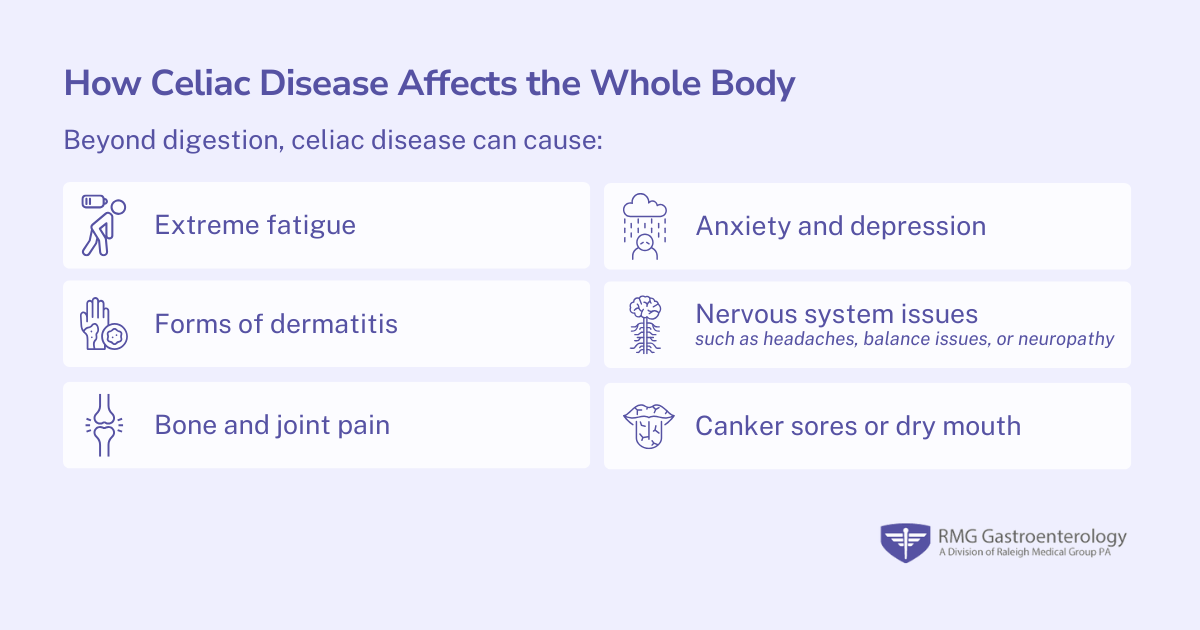How Can GI Doctors Help With Celiac Disease Symptoms?
It can be embarrassing to talk about: chronic diarrhea, excessive gas and constipation. These are some of the more common symptoms of celiac disease, which can damage the small intestine.
You should never be embarrassed to discuss these topics with us because, as GI doctors in Raleigh and the surrounding region, we’re in a perfect position to help.
We’ll examine some of the common symptoms of celiac disease, the causes, and how our GI doctors can provide safe and effective treatment.
What Are The Symptoms of Celiac Disease?
The most common symptoms include:
- Stools that are loose, greasy and bulky
- Bloating
- Constipation
- Chronic diarrhea
- Unusually bad-smelling stools
- Nausea
- Vomiting
- Gas
- Abdominal pain
Be aware that you may not have these symptoms all the time—they may come and go. It’s not unusual for those with celiac disease to also have digestive problems, and symptoms can vary from person to person. Our GI doctors have treated hundreds of patients with celiac, so we are well-versed in pinpointing the cause of these symptoms and are able to determine whether or not it is celiac disease.
How Does Celiac Disease Affect Other Parts of the Body?
It can affect other parts of the body, creating additional symptoms that are different from the digestive ones.

What Causes Celiac Disease?
Research is still ongoing to pinpoint the exact cause of celiac disease, but scientists believe that it has a genetic component. This causes your body’s immune system to overreact to gluten, damaging the villi (hairlike projections) lining your small intestine.
When those with the affected genes eat foods that contain gluten, they can develop celiac.
There may also be a connection between celiac and gastrointestinal infections, gut bacteria, and even infant-feeding practices. However, researchers are still exploring those possibilities.
What Foods Trigger Celiac Disease?
If you have celiac, there will be certain foods you need to avoid. We can provide a more comprehensive list for you, but typically it involves avoiding foods like:
- Barley
- Bulgur
- Graham flour
- Wheat starch
- Durum
- Rye
- Malt
- Spelt (a type of wheat)
How Do GI Doctors Diagnose Celiac Disease?
As we mentioned before, there are many gastrointestinal issues that may cause symptoms similar to celiac disease. Therefore, a timely and accurate diagnosis is crucial. We may perform one of the following tests to see if you have the disease:
Blood tests
These will look for certain antibodies in your blood. We may also conduct genetic testing.
Endoscopy
An upper endoscopy uses a long, thin tube with a tiny light and camera that is gently passed down your throat. Through this test, our GI doctors can get a clear view of your small intestine and take a tissue sample to examine.
Capsule Endoscopy
During this test, we give you a small capsule to swallow. The capsule contains a small, wireless camera which will take pictures of your intestines as it travels through your system. These images are then easily transmitted to a recorder.
See Why Area Patients Choose Our GI Doctors in Raleigh and the Surrounding Areas
Not only do we have the leading GI doctors in the region, but we also have been named a Center of Excellence for inflammatory bowel disease, liver disease, advanced GI therapeutics and women’s health.
We offer several convenient locations in:
- Raleigh
- Cary
- Clayton
- Smithfield
- Wilson
- Knightdale
- Henderson
At each of these locations, our mission remains the same: to offer the highest level of compassionate care coupled with advanced technology to create treatments tailored to your needs.
Scheduling an appointment online is easy. Contact us today.




